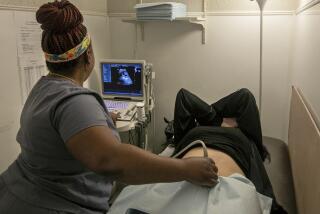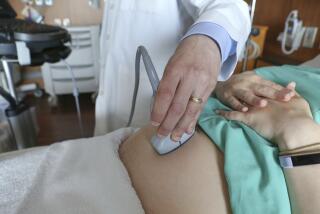No-Risk Test Can Reassure Expectant Mothers
- Share via
The fetus is so tiny, it’s still just a blur on the ultrasound screen, its features a white, fuzzy outline. Its weight can still be measured in mere ounces; its length in centimeters.
The growing fetus is just 10 1/2 weeks old, but in a tiny space on the back of its neck, specially trained doctors can take a precise measurement that will help them screen for such chromosomal disorders as Down syndrome or Trisomy 18, a serious defect few babies survive.
Medical researchers have found that the neck space, known as a nuchal translucency, is sometimes slightly enlarged in infants with chromosomal defects, explains Dr. William Cusick, assistant director of maternal/fetal medicine at Stamford Hospital in Stamford, Conn. The difference can be measured in tenths of millimeters. And by measuring that space and analyzing the mother’s blood for certain pregnancy-related proteins, researchers report as much as 89% success in diagnosing Down syndrome and Trisomy in a pregnancy’s first trimester. The test, which is already routine in Britain and most of Europe, is accurate enough that the American College of Obstetricians and Gynecologists recently described the screening as a test that’s “effective and offers substantial benefits to clinicians and patients.”
“Women like insight when they are pregnant. They are anxious to know if things are normal,” says Cusick, who is certified to conduct the screening by the London-based Fetal Medicine Foundation, which developed the protocol for the test.
“And now, because of this test, we are able to give that insight so much earlier,” he says. “And the information we’re giving, I believe, is much more accurate.”
Since it was first offered in the United States in 1995, about 30,000 American women have had the test. “Like anything new, it’s not routine, but it’s catching on,” says Dr. Phillip D. Buchanan, director and president of GeneCare, a Chapel Hill, N.C., laboratory that analyzes the test results for area hospitals. “And it’s important to note that this test doesn’t replace more comprehensive screenings like amniocentesis. That, I believe, is still what we should be recommending for women 35 and over who are at higher risk for these problems.”
The first-trimester screening gives parents insight into their babies’ health up to four weeks earlier than the standard blood screening, known as the AFP (alphafetoprotein) test, which is known for its high false-positive rate. “A lot of doctors and patients don’t like that test because it isn’t terribly reliable. It causes a lot of stress for parents who get told their babies might have this or that,” Cusick says. “This test, I believe, is producing results that are much more accurate, much sooner.”
Still, doctors and researchers stress that the first-trimester test, just like the AFP, cannot absolutely confirm the presence of Down syndrome, which causes mental retardation, or other serious birth defects.
What the first-trimester screening can do is give doctors and patients a fairly reliable prediction of whether the disorders are present, helping patients proceed with the riskier amniocentesis, which can ultimately confirm the diagnosis. That procedure, which involves the insertion of a syringe into the womb to extract amniotic fluid for laboratory analysis, is associated with a small risk of miscarriage and is unpopular with squeamish moms-to-be.
Obstetricians who are recommending the early screening to some patients say it’s an excellent way to soothe the nerves of patients with serious concerns about birth defects or worries about the safety of amniocentesis. Most obstetricians in private practice don’t perform it because of the special training required for certification to measure the nuchal translucency.
“I try to put myself in their shoes. If you want this information, wouldn’t you want it earlier if you could have it?” says Dr. Thomas Ayoub, an obstetrician/gynecologist in private practice in Norwalk, Conn.
He often encourages women 35 and older, those at higher risk for chromosomal disorders, to have amniocentesis. “If they have this early screening and it’s negative, it can save them the stress and worry of a much riskier test,” Ayoub says. For couples who would opt for abortions if the results of an amniocentesis were positive, “they can have a simple procedure and save themselves the trauma of doing something when the pregnancy has progressed that much further along,” he says.
Cusick says he worries the test will be depicted as an option for parents who are likely to have abortions if their children are not healthy or normal. “Certainly, the specter of [abortion] is there,” he says. “But for the vast majority of patients that’s not what it’s about. Most people are going to walk away from this with very good news. And more than anything I think they want to prepare for any possible outcome.”
Norwalk Hospital’s genetics counselor, Lucinda Mallin, who says about 35 patients opted for the first-trimester screening since the hospital began offering it last month, says the test also has an appeal for anxious, younger mothers.
Even though the risks for chromosomal defects are higher in older moms, “you have to remember that about 80% of Down syndrome’s babies are born to women 35 and younger simply because they have the majority of babies,” Mallin says. “I think this test is a good, noninvasive way for them to put to rest any doubts they have about their pregnancy very early on.”
Ease of mind is why Pam Paterson, 34, and 14 weeks pregnant with her first child, took the early screening test two weeks ago at Stamford Hospital.
“I’m at the age where I’m right on the border of being in a higher risk group for some of these problems,” says Paterson, a special education teacher. “And because of my background in teaching, I know how serious some of these things can be. I wanted to make sure everything was OK, but I was really not wild about the idea of having amnio.”
Paterson, referred by her obstetrician, Dr. Joel Evans, received good news last week. The test “determined my odds of carrying a child with Down syndrome were very low,” she says, adding she opted not to have a follow-up amniocentesis. “Statistically, I was told my odds of having a miscarriage from that [procedure] are higher than having a baby with a birth defect. Now I’m just looking forward to enjoying my pregnancy.”
*
While the early screening test is standard practice in Britain and most of Europe, it is still the subject of ongoing clinical trials in the United States, including one at the Yale University School of Medicine.
GeneCare’s Buchanan notes that one drawback to the test is that it does not screen for hundreds of other chromosomal disorders that can occur in a small percentage of pregnancies. That is why he stresses the importance of amniocentesis for women age 35 and older. “That’s one reason why I would say this test is really excellent for low-risk women,” he says. “If a high-risk woman uses this alone as a determination of whether she’s going to have a healthy baby, she has to realize a lot could be missed.”
One other drawback is that because the test is new, some insurers won’t pay for it. Cusick says the blood work and ultrasound together cost about $200. “But we are finding more and more insurance companies are willing to pay for it,” says Buchanan. “It’s just something that makes a lot of sense.”
More to Read
Sign up for Essential California
The most important California stories and recommendations in your inbox every morning.
You may occasionally receive promotional content from the Los Angeles Times.













